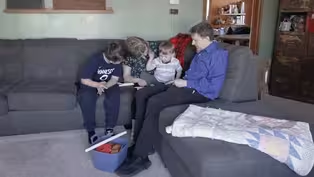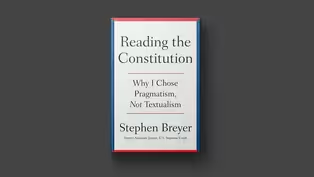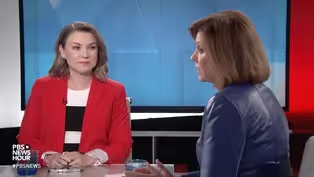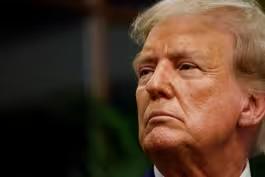
Rift between U.S., Israel widens over cease-fire resolution
Clip: 3/25/2024 | 4m 46sVideo has Closed Captions
Rift between U.S. and Israel widens over U.N. Gaza cease-fire resolution
There is a public break between the United States and Israel after the U.S. refused to veto a UN Security Council resolution that calls for a cease-fire in Gaza. Prime Minister Benjamin Netanyahu accused the U.S. of changing its policy on the war in Gaza and canceled a planned visit of his top aides to Washington. Nick Schifrin reports on the latest developments.
Problems playing video? | Closed Captioning Feedback
Problems playing video? | Closed Captioning Feedback
Major corporate funding for the PBS News Hour is provided by BDO, BNSF, Consumer Cellular, American Cruise Lines, and Raymond James. Funding for the PBS NewsHour Weekend is provided by...

Rift between U.S., Israel widens over cease-fire resolution
Clip: 3/25/2024 | 4m 46sVideo has Closed Captions
There is a public break between the United States and Israel after the U.S. refused to veto a UN Security Council resolution that calls for a cease-fire in Gaza. Prime Minister Benjamin Netanyahu accused the U.S. of changing its policy on the war in Gaza and canceled a planned visit of his top aides to Washington. Nick Schifrin reports on the latest developments.
Problems playing video? | Closed Captioning Feedback
How to Watch PBS News Hour
PBS News Hour is available to stream on pbs.org and the free PBS App, available on iPhone, Apple TV, Android TV, Android smartphones, Amazon Fire TV, Amazon Fire Tablet, Roku, Samsung Smart TV, and Vizio.
Providing Support for PBS.org
Learn Moreabout PBS online sponsorshipWILLIAM BRANGHAM: Welcome to the "NewsHour."
There is a public break tonight between the United States and Israel after the U.S. refused to veto a U.N. Security Council resolution calling for an immediate cease-fire in Gaza.
Israeli Prime Minister Benjamin Netanyahu accused the U.S. of changing its position on the war in Gaza and canceled a planned visit of his top aides to Washington.
Nick Schifrin is here now with more on these fast-moving developments.
Nick, what is it that happened today that led to this very public disagreement?
NICK SCHIFRIN: The U.N. Security Council today for the first time in more than five months of war demanded a cease-fire in Gaza.
And it did so because, as you just said, the U.S. abstained on a vote.
Resolution 2728 -- quote -- "demands an immediate cease-fire for the month of Ramadan, respected by all parties, leading to a lasting and sustainable cease-fire, and also demands the immediate and unconditional release of all the hostages."
So while we keep up that text, just a few points.
One, the holy month of Ramadan is already halfway over.
Two, the word lasting was replaced because the U.S. asked for it, rather than the quote -- than the word permanent.
And, three, that paragraph there refers to a cease-fire and hostage release in the same paragraph.
An earlier draft allowed those two things to be split.
And that is what -- the reason why the U.S. abstained today, according to U.S. ambassador to the U.N. Linda Thomas-Greenfield.
LINDA THOMAS-GREENFIELD, U.S.
Ambassador to the United Nations: We fully support some of the critical objectives in this nonbinding resolution.
And we believe it was important for the council to speak out and make clear that our cease-fire must, any cease-fire, must come with the release of all hostages.
NICK SCHIFRIN: But the resolution did not condition the cease-fire on the hostage release, nor did it condemn Hamas' terrorist attack of October the 7th.
And that is why Netanyahu said today, hey, look, that's what you were calling for in your own draft resolution.
You have changed your policy.
That led to Netanyahu canceling this delegation that was supposed to arrive tomorrow to Washington.
And it led to this statement by Israeli Ambassador to the U.N. Gilad Erdan: GILAD ERDAN, Israeli Ambassador to the United Nations: Your demand for a cease-fire, without conditioning it on the release of the hostages, not only is not helpful, but it undermines, undermines the efforts to secure their release.
To this council, Israeli blood is cheap.
This is a travesty, and I am disgusted.
NICK SCHIFRIN: In response to that, National Security Council spokesman John Kirby today tried to downplay what the U.S. had done.
They said -- he said that the Israeli cancellation of the delegation was disappointing, but he also said, William, that Netanyahu was making a bigger deal of today's vote than it was actually.
JOHN KIRBY, NSC Coordinator For Strategic Communications: We get to decide what our policy is.
The prime minister's office seems to be indicating, through public statements, that we somehow changed here.
We haven't.
And we get to decide what our policy is.
It seems like the prime minister's office is choosing to create a perception of daylight here, when they don't need to do that.
WILLIAM BRANGHAM: So, how serious do U.S. officials believe this rift really is?
NICK SCHIFRIN: I mean, Kirby, as he said, he's disappointed that the U.S. won't be able to detail their alternative to the assault on Rafah.
Israeli officials say that an assault on Rafah is necessary because Hamas' final four battalions are based there.
But two U.S. officials told me that the U.S. had planned to provide a detailed alternative to an assault on Rafah, more about targeting high-value members of Hamas, doing more to secure the Egyptian border and allowing displaced Gazans to go home to Central and Northern Gaza.
U.S. officials, frankly, are skeptical that Israel wants to hear an alternative to an assault on Rafah because all Israeli officials are convinced it's necessary, as we heard from Yoav Gallant, defense minister, who's visiting Washington as well today.
YOAV GALLANT, Israeli Defense Minister (through translator): In my first meeting, which will be with National Security Adviser Jake Sullivan, I will stress the importance of destroying Hamas and returning the hostages home.
We will operate against Hamas everywhere, including in places where we have not yet been.
NICK SCHIFRIN: Not yet been -- not yet been is presumably a reference to Rafah.
Bottom line, two U.S. officials also think that Netanyahu is playing domestic politics here, because his coalition is at a particularly fragile moment.
But, look, there has been tension between the administration and the Israeli government, today particularly public.
WILLIAM BRANGHAM: Nick Schifrin, as always, thank you so much.
NICK SCHIFRIN: Thank you.
Families slip into poverty after child tax credit expires
Video has Closed Captions
Clip: 3/25/2024 | 10m 16s | Families slip back into poverty after pandemic-era child tax credit expires (10m 16s)
Fate of abortion pill mifepristone goes before Supreme Court
Video has Closed Captions
Clip: 3/25/2024 | 7m 48s | Future of abortion pill mifepristone will be decided by Supreme Court (7m 48s)
Stephen Breyer on new book 'Reading the Constitution'
Video has Closed Captions
Clip: 3/25/2024 | 10m 30s | Stephen Breyer on new book 'Reading the Constitution' and debate over how to interpret it (10m 30s)
Tamara Keith and Susan Page on Trump's legal issues
Video has Closed Captions
Clip: 3/25/2024 | 6m 58s | Tamara Keith and Susan Page on the political impact of Trump's legal issues (6m 58s)
Trump hush money trial set for April 15
Video has Closed Captions
Clip: 3/25/2024 | 5m 11s | Trump hush money trial set for April 15 as N.Y. court reduces fraud bond (5m 11s)
Providing Support for PBS.org
Learn Moreabout PBS online sponsorship
- News and Public Affairs

FRONTLINE is investigative journalism that questions, explains and changes our world.

- News and Public Affairs

Amanpour and Company features conversations with leaders and decision makers.












Support for PBS provided by:
Major corporate funding for the PBS News Hour is provided by BDO, BNSF, Consumer Cellular, American Cruise Lines, and Raymond James. Funding for the PBS NewsHour Weekend is provided by...




